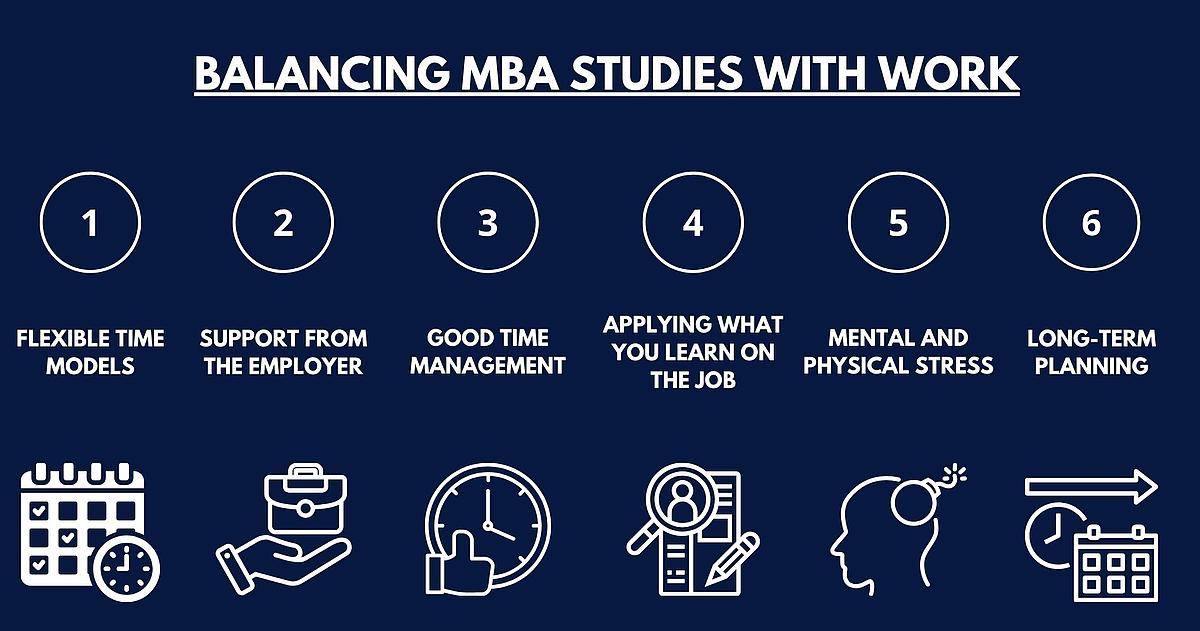This Website uses cookies to improve your visit on our website. More Info
MBA Part-time vs. Full-time: What path suits you?
An extra-occupational MBA (Master of Business Administration) offers professionals the opportunity to further educate themselves while continuing their professional activities and to improve their career prospects. In contrast to a full-time course of study, this program can be flexibly integrated into the working day. But what advantages does an extra-occupational MBA offer, and what challenges does it present? In this article, we shed light on the most important aspects of this educational pathway and provide an overview of the requirements, the process and the potential career opportunities that arise from it.
How does an MBA program work that is designed for working professionals?
An MBA program for working professionals is designed to be flexible and can be integrated into the daily routine of working professionals. It essentially works through a combination of classroom sessions, online learning, and self-study. Here is an overview of how such a program works:
- Flexible scheduling: Classes are usually held in the evenings, on weekends, or in block seminars so that working professionals can continue to work full-time. This makes it possible to combine your studies with your job.
- Online and in-person phases: A large part of the course content is taught online. This includes recorded lectures, interactive online seminars or learning platforms that students can use to access materials and complete assignments. In addition, there are regular in-person phases in which students can interact directly with lecturers and fellow students.
- Modular structure: The studies are often divided into individual modules, each covering specific management topics such as finance, marketing, strategy or leadership. Each module is completed in a certain period of time, often with an exam or a project.
- Practical relevance: Part-time MBA programs place particular emphasis on practical relevance. Much of the course content can be applied directly in your professional life, and often there are projects based on real-life professional challenges.
- Networking: In addition to professional development, interacting with other students and lecturers is a key aspect. An extra-occupational MBA offers the opportunity to make contacts and expand your professional network, which is particularly important for career development.
Overall, an extra-occupational MBA requires good self-organization and discipline, but offers the advantage that students do not have to interrupt their professional career and can acquire valuable qualifications at the same time.
The MBA at Munich Business School is the leading program in Munich for young and experienced professionals who want to advance their careers. In our MBA program, you will not only learn to respond to the ever-changing challenges of the business world, but also to meet them innovatively and flexibly. The practice-oriented curriculum gives you a comprehensive understanding of key business concepts and current challenges, and allows you to gain valuable practical experience. The program includes CV revisions, career coaching, interview training and career events – all crucial building blocks for a successful transition from study to work.
MBA at Munich Business SchoolAdvantages and disadvantages of an MBA while working
This table provides an overview of the most important advantages and disadvantages of studying for an MBA while working.
| Advantages | Disadvantages |
|---|---|
| Professional experience and parallel studies | High time commitment |
| Direct application of what you have learned on the job | Less free time and family restrictions |
| Improvement of career opportunities | Increased financial burden due to tuition fees |
| Expansion of your professional network | High pressure and stress due to the double burden |
| Flexibility through evening and weekend courses | Longer study duration compared to full-time studies |
Balancing the part-time MBA program with work
Balancing an MBA program with a career is one of the biggest challenges, but also a major advantage of this form of study. Many MBA programs are specifically designed to enable working professionals to continue their careers while they further their education. However, this requires a good balance of various factors to be successful. Here are some aspects that are particularly important for balancing work and study:
Overview: Balancing MBA studies with work
The following graphic offers a brief overview of how to balance MBA studies with work. This can help many prospective students to adapt to new challenges.

Explanation: Balancing MBA studies with work
Balancing a part-time MBA program with work is feasible, but it requires good organization, support from the employer and strong self-motivation. With the right balance, students can not only develop their professional skills but also significantly improve their career opportunities without interrupting their professional careers.
Flexible time models
Part-time MBA programs usually offer flexible time models, such as evening or weekend courses and online learning units. This allows students to coordinate their working hours relatively well with the demands of their studies. Some programs offer block seminars that extend over a few days or weeks, so that the study time is concentrated in a targeted manner.
Support from the employer
An important factor for success is support from the employer. Many companies are willing to ease the workload of employees during their studies, whether it be through flexible working hours or the option of taking special leave for exams or intensive study phases. In some cases, companies even offer financial support or cover some or all of the tuition fees.
Good time management
To successfully combine work and study, effective time management is essential. Students need to plan their professional commitments, study content and leisure time carefully in order to meet all requirements. This also includes setting priorities and being aware that personal activities may have to take a back seat during periods of heavy workload or before exams.
Applying what you learn on the job
A major advantage of an MBA program designed for working professionals is that what you learn can often be applied directly to your day-to-day work. Many programs place a strong emphasis on practical relevance, which means that projects or case studies often address real-world professional challenges. This allows students to immediately use their knowledge to achieve better results on the job or develop new solutions.
Mental and physical stress
Combining a job and studies can lead to a high level of stress, which can have both psychological and physical effects. To avoid overwork, it is important to plan regular breaks and use stress management techniques. Support from family and friends also plays an important role in helping you to balance out stressful phases.
Long-term planning
An MBA program that is completed alongside work usually takes longer than a full-time program, as it is adapted to professional requirements. This requires long-term planning, both in terms of one's career and personal commitments. Whether students are able to reconcile these commitments depends largely on whether they are willing to accept a double burden for a certain period of time in order to benefit from better career opportunities later on.
Structure of a
part-time MBA

Structure of a part-time MBA program
| Phase | Content | Duration |
|---|---|---|
| Introduction phase | Introduction to the course of study, development of soft skills and time management | 1-2 months |
| Basic modules | Core subjects such as Business Administration, Marketing, Financial Management, Human Resources Management | 6-12 months |
| Optional modules | Specialization in areas such as International Business, Corporate Management | |
| Master's thesis | Independent scientific work on a practice-related topic | 6-12 months |
You can find the structure of the MBA program at Munich Business School here:
MBA CurriculumMBA part-time studies: What challenges lie ahead?
Part-time studies have numerous advantages, such as the opportunity to acquire valuable qualifications while continuing in employment. However, there are also some challenges that need to be overcome. Here are the most common difficulties that students face in part-time studies:

- Time management: The biggest challenge is balancing studies and work. In addition to full-time work, studying requires extra time for lectures, exam preparations and project work. Good time management and discipline are essential to master the balancing act between work, study and private life.
- High stress: A part-time degree program can be stressful because professional and academic demands have to be met at the same time. Long working days and additional study in the evenings or at weekends can quickly lead to overload, which is physically and mentally exhausting in the long run.
- Sacrificing free time: In order to successfully complete their studies, students often have to cut back on their free time. Hobbies, social activities or even time with family and friends can fall by the wayside, which can lead to feelings of isolation or overwhelm.
- Financial burden: Part-time studies often come with tuition fees that have to be covered in addition to living expenses. Even if an employer covers some of the costs, studying often remains a financial challenge.
- Maintaining motivation: Combining studies and a job over a longer period of time requires not only stamina but also a high level of self-motivation. It can be difficult to muster the energy for studying after a long day at work. Regular breaks and clear goals can help to maintain motivation.
- Lack of flexibility in the job: Not all employers are flexible enough to support the additional effort of studying. If the job is too inflexible or the company is not understanding of the study requirements, it can be difficult to create the necessary time off for exams or lectures.
- High demands on self-organization: Since part-time degree programs require a great deal of personal responsibility, students must be able to organize themselves well. From completing assignments on time to preparing for exams, studying requires a great deal of planning and structure.
These challenges can be demanding, but with the right approach and support, they can be overcome. The rewards are valuable new qualifications and improved career opportunities.
Investing in the future with an executive MBA
An executive MBA is a significant investment in the future that requires time, energy and financial resources, but can offer great long-term benefits for your career and personal development. Here are some reasons why this investment is worthwhile:
| Improve career opportunities | An MBA degree, especially one obtained on the job, signals to employers that you not only have the professional qualifications for higher management and leadership positions, but also the discipline and stamina to successfully combine studies and work. This opens doors to new positions, promotions and an expanded professional network. |
|---|---|
| Increase salary potential | An MBA degree can lead to a significant long-term increase in salary. Studies show that MBA graduates typically earn higher salaries than those without the qualification. Particularly in the area of management and leadership, there are attractive income opportunities that offset the initial investment costs for the program. |
| Expand your expertise and leadership skills | During their studies, participants acquire in-depth knowledge in areas such as Finance, Marketing, Strategy and Human Resource Management. Particularly valuable are the leadership and management skills taught, which are in demand in almost every industry. This knowledge can be applied directly in your current job, furthering your professional success. |
| Expand your professional network | A part-time MBA offers the opportunity to network with other professionals and executives. Your fellow students often come from a range of different industries, which promotes the exchange of knowledge and experiences. This network can later lead to important professional contacts and career opportunities. |
| Personal development | In addition to the professional benefits, a part-time MBA also promotes personal development. The ability to overcome professional challenges while pursuing a demanding course of study strengthens self-confidence and promotes self-discipline, time management and problem-solving skills. |
| Long-term return on investment | Although the financial and time investment may seem high at the beginning, an MBA offers an excellent long-term return on investment. Higher earning potential, more career options and the improvement of soft skills ensure that the investment in the program pays off many times over the years. |
An extra-occupational MBA is an investment in the future that not only brings advantages at the professional level, but also contributes to personal growth. The ability to successfully combine studies and work, and the knowledge and skills acquired ensure that graduates are better prepared for the challenges of the working world and benefit from better career and salary opportunities in the long term.
If you want to learn more about the future prospects after an MBA, please feel free to visit our blog:
Blog posts about the MBAPart-time MBA or full-time MBA: Which is right for you?

Part-time MBA or full-time MBA: Which is right for you?
| Criterion | Part-time | Full-time |
|---|---|---|
| Duration of studies | 2-4 years, depending on the program | 1-2 years, depending on the program |
| Compatibility with work | Can be easily combined with a job, as courses take place in the evening or at the weekend | Not possible to work while studying; focus is on the course |
| Financing | Employer can often provide financial support; regular income remains | No income during studies; often higher tuition fees |
| Networking opportunities | Network of fellow students and professional contacts can be expanded at the same time | Intensive networking opportunities through daily presence and international contacts |
| Time commitment | High double burden, as work and study run in parallel | Complete focus on studies |
| Flexibility | Flexible time management, but less freedom | Less flexible, as attendance is often mandatory |
More information about full-time MBA studies at Munich Business School:
Full-time MBA at MBSStaying abroad during part-time MBA studies
A stay abroad during an MBA program is a valuable opportunity to gain international experience and develop intercultural skills. Especially in the case of part-time MBA programs, there are often special options for integrating experiences abroad despite professional commitments. Here are the most important aspects of a stay abroad as part of an MBA program:
Options for staying abroad
Many MBA programs offer the opportunity to complete part of your studies abroad. This may be through exchange programs, international partner universities or special seminars abroad. For part-time programs, these stays are often organized in the form of shorter intensive programs, known as “study trips”, in order to ensure compatibility with work.
Advantages of staying abroad
- International experience: A stay abroad makes it possible to familiarize yourself with other markets and business cultures. This is particularly valuable if you work in a global environment or would like to take on international responsibility in the future.
- Network expansion: By spending time abroad, you will be able to make contacts with international students and professionals that can be beneficial later in your professional life.
- Language skills: A stay abroad offers the opportunity to improve language skills or learn new languages, which increases your attractiveness on the international job market.
- Intercultural skills: Intercultural skills are essential in a globalized economy. Direct contact with other cultures promotes understanding of different business practices and ways of thinking.
Challenges
- Time pressure: Staying abroad requires additional time, which can make it difficult to reconcile it with work commitments. Often, vacation time has to be used for this or special arrangements have to be made with the employer.
- Financial costs: Staying abroad usually involves additional costs, e.g. for travel, accommodation and meals. However, some programs offer scholarships or financial support for such stays.
- Organizational effort: Planning and organizing a stay abroad, especially in the case of part-time programs, requires additional coordination with the employer and the university.
Integration into part-time studies
Many part-time MBA programs have special programs abroad that are tailored to the needs of working professionals. These stays often last only a few weeks and offer condensed learning units as well as excursions to international companies. This allows students to benefit from the experience abroad without taking too long off from their jobs.

There are numerous advantages to staying abroad during your MBA studies, including the opportunity to gain international business experience and expand your network. For part-time students, this can be a challenge in terms of time and organization, but well-planned programs make it possible to integrate this valuable experience into a part-time MBA.
More information about staying abroad:
Internship Abroad
Language Trips
Letter of Motivation for a Semester Abroad
Packing List: Semester Abroad
Semester Abroad
Staying Abroad
Studying Abroad
Checklist for your MBA studies
This checklist helps you to approach your part-time MBA studies systematically and ensure that you don't overlook anything important.
| Before your studies | ||
|---|---|---|
| Define your career goals | Develop a clear idea of your goals and expectations of the MBA. | |
| Research study programs | Compare different MBA programs (content, duration, specializations, reputation of the university). | |
| Choose a study format | Select the appropriate format (on-site, online, hybrid). | |
| Check accreditation | Ensure that the MBA program is recognized and accredited. | |
| Clarify financing | Check the costs of the program and evaluate financing options (loans, scholarships, employer subsidies). | |
| Plan your time management | Consider how much time you can set aside for your studies each week. | |
| Seek support from your employer | Talk to your employer about possible leaves of absence, special leave or financial support. | |
| Consider your work-life study balance | Think about how you can integrate your studies into your professional and private life. | |
| At the beginning of your studies | ||
| Organize your timetable | Get an overview of lectures, exams and deadlines. | |
| Create a personal study plan | Set a realistic schedule for working on learning content and assignments. | |
| Set up a learning environment | Organize a quiet, productive workspace at home or in the office. | |
| Build a network | Make contact with fellow students and lecturers to create a supportive network. | |
| Use online resources | Familiarize yourself with the learning platform and the digital tools of the degree program. | |
| During your studies | ||
| Review your time management | Regularly adjust your own schedule and plan time for breaks. | |
| Apply what you have learned on the job | Look for opportunities to apply the course content directly in your professional practice. | |
| Foster exchange | Actively participate in discussions and group work to benefit from the exchange with others. | |
| Maintain motivation | Reflect on your own progress and celebrate small successes when you feel demotivated. | |
| Inform your employer about your progress | Provide regular updates on your studies and the skills you are applying on the job. | |
| Use external resources | Take additional courses, read books or watch webinars to deepen your knowledge. | |
| Before completing your studies | ||
| Plan your master's thesis | Choose a topic early on, talk to your supervisor and set a schedule for the work. | |
| Organize your exam preparation | Allow time to prepare for final exams and adapt your study strategies. | |
| Expand your network | Attend alumni and networking events to make contacts. | |
| Plan future career moves | Consider how the MBA degree can be used for the next career move. | |
| Discuss results with employer | Discuss opportunities for promotion or new areas of responsibility. | |
| After your studies | ||
| Obtain your diploma and certificates | Make sure you have all the necessary documents to hand. | |
| Prepare your applications | Update your résumé and application documents to reflect your MBA. | |
| Continue applying the knowledge you have acquired | Continue to use your new skills and knowledge in your job. | |
| Continue networking | Continue to maintain your alumni network and contacts from your studies. | |
| Review long-term career goals | Evaluate whether the goals you set have been achieved and define new career goals. |
Related Study Guide Topics:
Salary Negotiation
Salary Check
Working alongside your Studies
Online Study
Studying in Munich, Germany
FAQ
MBA studies can be useful if you want to advance your career in management or leadership positions. It provides you with valuable knowledge in areas such as business administration, strategy and leadership, and offers you the opportunity to expand your professional network. An MBA also increases your chances of higher salaries and better job opportunities. However, you should also weigh up the costs, the time required and your professional goals to decide whether it is the right choice for you.
No, an MBA is not always part-time. There are both full-time and part-time programs. The part-time option is particularly suitable for those who want to continue working alongside their studies, while a full-time MBA usually requires a temporary career break.
Yes, it is possible in some cases to do an MBA without a bachelor's degree, but it depends on the program. Some schools make exceptions if you have extensive work experience and leadership skills. It depends on the individual admission criteria of the respective institution.
An MBA program can be demanding, especially if you are studying part-time while working. It requires good time management, discipline, and a willingness to learn complex topics such as business administration, finance, and leadership. How hard it is for you also depends on your previous experience and your motivation.
A bachelor's degree in any subject is common before an MBA, but often in Business Studies, Engineering, Economics or similar fields. However, work experience is also crucial, especially in management or leadership positions.
Interested in a study program? Request our information material now!
More exciting degree programs in Munich













